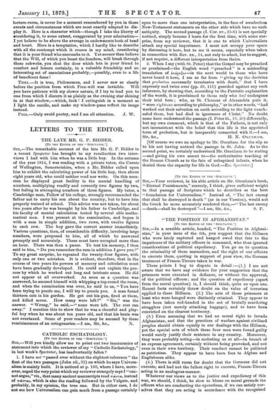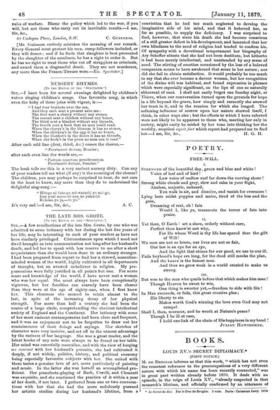"THE POSITION IN AFGHANISTAN."
[TO THE EDITOR OF THE " SPECTATOR."]
SIR,—In a sensible article, headed, " The Position in Afghani- stan," in your issue of the 4th, you suggest that the Hillmen who were lately captured and hanged owed that fate to the impatience of the military officers in command, who thus ignored considerations of political expediency. You go on to question the criminality of these marauders, and the right of our officers to execute them, quoting in support of your view, the German treatment of Francs-Tireurs taken in war.
These points I beg to dispute in detail :—(1.) I am not aware that we have any evidence for your suggestion that the prisoners were executed in defiance, or without the approval, of the political officers ; and the question of expediency (apart from the moral question) is, I should think, quite an open one. Recent facts certainly throw doubt on the value of terrorism applied to these Hillmen. (2.) The acts of those prisoners at least who were hanged were distinctly criminal. They appear to have been taken red-handed in the act of brutally murdering stragglers (not merely attacking baggage), and to have been convicted on the clearest testimony.
(3.) Even assuming that we had no moral right to invade Afghanistan, and that the practices of warfare against civilised peoples should obtain equally in our dealings with the Hillmen, yet the special acts of which these four men were found guilty would surely justify their sentence in any country. Moreover, they were probably acting—in molesting us at all—in breach of an express agreement, certainly without being provoked, and not even in their own territory. Their conduct cannot be palliated as patriotism. They appear to have been foes to Afghan and Englishman alike.
(4.) There is still room for doubt that the Germans did not execute, and had not the fullest right to execute, Francs-Tireurs acting in an analogous manner.
Whatever our views as to the justice and expediency of this war, we should, I think, be slow to blame on moral grounds the officers who are conducting the operations, if we can satisfy our- selves that they are acting in accordance with the recognised rules of warfare. Blame the policy which led to the war, if you will, but not those who carry out its inevitable results.—I am, Sir, &c., 40 Cadogan Place, London, S.W. C. GUINNESS.
[Mr. Guinness entirely mistakes the meaning of our remark. Every General must protect his men, camp-followers included, or they will desert ; and if he finds that slaughter is best prevented by the slaughter of the assailants, he has a right to order it. But he has no right to treat those who cut off stragglers as criminals, and award them a disgraceful death. They are not murderers, any more than the Francs-Tireurs were.—ED. Spectator.]







































 Previous page
Previous page